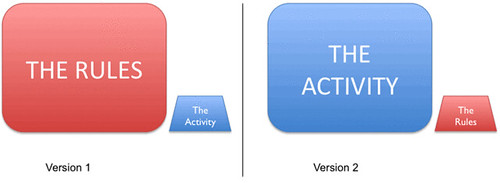Rules can help us get by in life – everyone agreeing to drive on the left probably reduces the accident rate on roads quite a bit. But rules have a tendency to take over, a bit like Lord Acton’s dictum on power. Sometimes it seems as though The Rules have become an end in themselves, rather than a means of managing activities more efficiently or propitiously.
In libraries it was once common to see long lists of rules – some of these were necessary to help preserve library materials (“No food or drink”) or to preserve a studious atmosphere for other library users (“No talking”) or just to ensure fair access (“No desk-hogging”). Some rules were a bit random but probably well-meaning (“Loans of unbound journals are limited to four days”) and some sound like scare tactics (“In the event of a book being lost or damaged, the borrower will be required to replace or restore it in good condition at his own charge”). Over the years the list of rules tended to grow longer, as rules were added in response to particular situations.
We more or less tore up our Library rules a few years back and the world has not collapsed. I think the world might be a better place if a few more rulebooks were torn up, and paperwork reduced. A recent study in the US found:
The average U.S. doctor spends 16.6 percent of his or her working hours on non-patient-related paperwork, time that might otherwise be spent caring for patients.
One of the frustrations of of working where I do is the necessity to observe some rules that are due to our being a remote part of government. We have to abide by a very strict IT security regime that is appropriate for protecting private information in the Department of Work and Pensions, but which is not at all suitable when dealing with scientific data about protein structures. Some of the procurement rules and recruitment rules also seem designed to be cruel and frustrating. And as for records management policies, words fail me.
I am looking forward to the day when we are no longer bound by these Whitehall-inspired rules.
But I don’t think that all rules and paperwork are bad. Some are there to encourage good behaviour or to promote cultural change.
I think that open access rules (mandates) fall into this category. They can seem to be a pain in the neck, the product of petty bureaucracy, but they are there to help improve science. One day in the not-too-distant future it will be second nature for all researchers to make their work open access. I look forward to the day when open access becomes the default mode and we start to write about non-open access research as “privately published” or some such phrase. OA mandates will help that change come about. Supportive services, such as those provided by many University and Institute libraries, can help to hasten that day too – making it easier for researchers to comply with the rules.
Perhaps this is just self-interest, but I firmly believe that (as a rule) researchers need a helping hand when it comes to complying with open access and open data mandates.


The bone I have to pick if less with “rules” per se, and more with the pervasive (US) culture of bureaucracy that has driven many to believe that the rules are not being enforced for the good of society, but rather to protect those who enforce them. As an example, annual or semi-annual online ‘safety exams’ for those of us who have been doing them 15 years running shows, in my view, what happens when we forget why there are rules in the first place…
Steve – yes, you are right. It is not the rules themselves that I object to, but those who enforce them and see that as their mission in life to the exclusion of any other purpose.